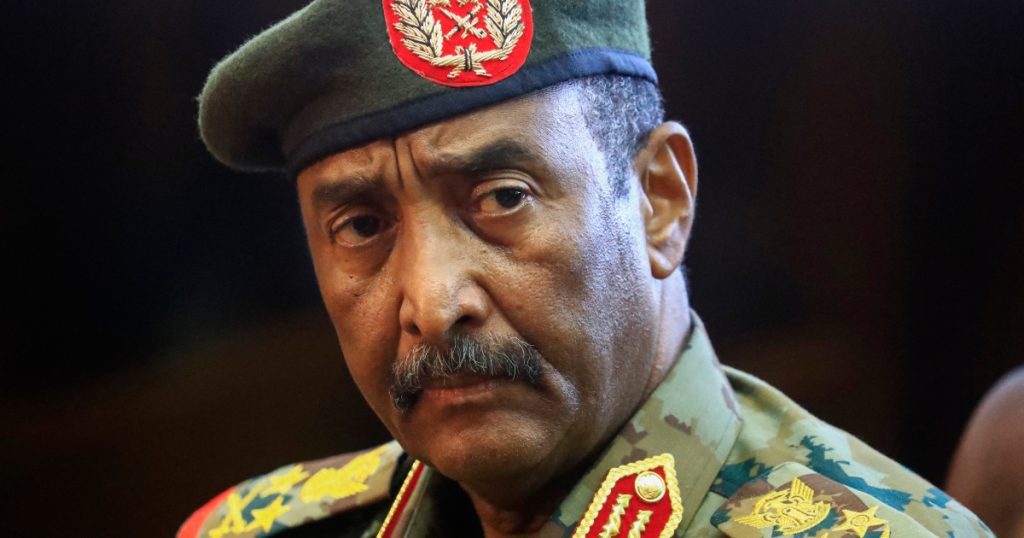
The leader of the Sudanese coup, General Abdel Fattah Al-Burhan, said that the army would give way to a civilian government, withdraw from the ongoing political talks, and allow political and revolutionary groups to form a transitional government.
The general’s comments on Monday come after a bloody week for the pro-democracy movement in Sudan with the continuation of large-scale protests demanding an end to military rule in the Khartoum region since Thursday.
Nine people were killed and at least 629 injured in the security forces’ crackdown on protests, according to the Sudanese Doctors’ Committee, which has tracked protest victims.
Al-Burhan said in a televised speech that the armed forces will not stand in the way of democratic transition, stressing the army’s commitment to work on “elections in which the Sudanese people choose who will rule them.”
He pointed out that the ruling sovereign council, led by Al-Burhan, consisting of military and civilians, will be dissolved after the formation of the new government.
The military commander said that a new Supreme Council of the Armed Forces will be formed after the formation of the government and will be responsible for security and defense tasks and “related responsibilities” in agreement with the government.
He noted that the army’s withdrawal from the political talks aims to allow political and revolutionary groups to form a technocratic government.
Al-Burhan called on the groups to start an “immediate and serious dialogue… that will bring everyone back to the path of democratic transformation.” He stressed that the army will be committed to implementing the outcomes of the dialogue, but he did not clarify the size of the political role of the armed forces in the future.
‘Very clear about their demands’
Since the military seized power in October 2021, authorities have faced near-weekly street protests with a deadly crackdown that has so far killed 113 people, including 18 children, according to observers.
In a report from the Sudanese capital, Khartoum, Al Jazeera’s Heba Morgan said the protesters were “very clear about their demands” and they “do not want the army to stay in power.”
Morgan said Major General Al-Burhan’s statement is unlikely to appease anti-military protesters.
“With the statement of Army Commander General Abdel Fattah Al-Burhan, it is clear that the army will remain in power until the political parties reach some kind of consensus to form a transitional government and set a deadline for elections,” Morgan said.
“This does not agree with the protesters. They have demanded, seven months ago, that they want the army removed before they see any form of negotiation taking place between the political parties to form a civilian-led transitional government.
“When it comes to political parties, they have trouble reaching that consensus,” Morgan added.
And let’s not forget that on the day of the takeover, Major General Abdel Fattah Al-Burhan said that it was the political differences between the parties that prompted the army to take power and dissolve the transitional government that was supposed to lead Sudan to democracy.
Since the coup that brought Al-Burhan to power, the United Nations Political Mission in Sudan, the African Union and the Intergovernmental Authority on Regional Development group of eight East African countries have been trying to mediate a way out of the political impasse. But the talks have not yielded results so far.
Pro-democracy groups have repeatedly said they will not negotiate with the military, and have called on them to immediately hand matters over to a civilian government.
The demonstrators were not impressed by the brigade’s words, and new demonstrators in the Berri neighborhood of Khartoum came out immediately after Al-Burhan’s televised speech.
“We have no confidence in the proof,” said Muhannad Othman, sitting atop a barricade set up by protesters. “We just want him to leave once and for all.”
Omaima Hussein, a protester in central Khartoum, said that Burhan should “be tried for all those killed since the coup” and vowed that the protesters “will bring him down just as we did with Bashir.”
Sudan has been in turmoil since a military coup upended its short-lived transition to democracy after 30 years of the repressive rule of former strongman Omar al-Bashir.
The army overthrew Bashir and the government in a popular uprising in April 2019.

“Travel specialist. Typical social media scholar. Friend of animals everywhere. Freelance zombie ninja. Twitter buff.”





More Stories
Taiwan is preparing to face strong Typhoon Kung-ri
Israel orders residents of Baalbek, eastern Lebanon, to evacuate
Zelensky: North Korean forces are pushing the war with Russia “beyond the borders”